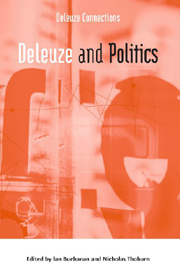Book contents
- Frontmatter
- Contents
- Dedication
- Acknowledgements
- Introduction: Deleuze and Politics
- 1 Power, Theory and Praxis
- 2 Deleuze and the Political Ontology of ‘The Friend’ (philos)
- 3 Molecular Revolutions: The Paradox of Politics in the Work of Gilles Deleuze
- 4 Schizoanalysis, Nomadology, Fascism
- 5 What is a Militant?
- 6 Bourgeois Thermodynamics
- 7 The Age of Cynicism: Deleuze and Guattari on the Production of Subjectivity in Capitalism
- 8 Deleuze, Materialism and Politics
- 9 Becoming-Democratic
- 10 Theorising European Ethnic Politics with Deleuze and Guattari
- 11 People and Fabulation
- 12 Micropolitical Associations
- Notes on Contributors
- Index
6 - Bourgeois Thermodynamics
Published online by Cambridge University Press: 12 September 2012
- Frontmatter
- Contents
- Dedication
- Acknowledgements
- Introduction: Deleuze and Politics
- 1 Power, Theory and Praxis
- 2 Deleuze and the Political Ontology of ‘The Friend’ (philos)
- 3 Molecular Revolutions: The Paradox of Politics in the Work of Gilles Deleuze
- 4 Schizoanalysis, Nomadology, Fascism
- 5 What is a Militant?
- 6 Bourgeois Thermodynamics
- 7 The Age of Cynicism: Deleuze and Guattari on the Production of Subjectivity in Capitalism
- 8 Deleuze, Materialism and Politics
- 9 Becoming-Democratic
- 10 Theorising European Ethnic Politics with Deleuze and Guattari
- 11 People and Fabulation
- 12 Micropolitical Associations
- Notes on Contributors
- Index
Summary
One way of thinking about the ways in which poststructuralist thought has contributed to political theory, and perhaps the experience of politics itself, is to consider thinkers such as Gilles Deleuze, Jacques Derrida and Michel Foucault as having extended and radicalised Kantian antifoundationalism. The Kantian ‘Copernican turn’ not only precludes the subject from making claims regarding things in themselves, resulting in a humility that concedes that we can only know the world as it is given through the relation we bear towards it (Langton 1998). Kantianism also places the subject of politics under erasure. We cannot study human nature and then prescribe either specific moral norms or even a certain mode of political formation (Rawls 1980). We could not, for example, make a claim along the line of contemporary neo-Aristotelianism and argue that it is precisely because we are social, linguistic, self-forming and emotional beings that we need a polity that is grounded in tradition, aware of human frailty and partiality, or conducive to narrative coherence (Taylor 1989; Nussbaum 2006). In its ideal form Kantianism would break with positive conceptions of the good and would argue for a purely formal politics.
In its poststructuralist radicalisation one could contest the extent to which such an avowedly critical, post-metaphysical or anti-foundational politics is possible. One way of reading Derrida's critique of the politics of liberalism would be to look at the ways in which the supposed break from all positive norms and figures of man must nevertheless require some exemplarity or figure from which the humanity that gives itself its own end can be thought.
- Type
- Chapter
- Information
- Deleuze and Politics , pp. 121 - 138Publisher: Edinburgh University PressPrint publication year: 2008



